
Perpetuating the timeless and universal wisdom of Rabbi Lord Jonathan Sacks as a teacher of Torah, a leader of leaders and a moral voice.
10 subscribers
How to get URL link on X (Twitter) App


 God is with us, in the rain that brings blessings to the earth, in the love that brought the universe and us into being and in the resilience of spirit that allowed a small and vulnerable people to outlive the greatest empires the world has ever known.
God is with us, in the rain that brings blessings to the earth, in the love that brought the universe and us into being and in the resilience of spirit that allowed a small and vulnerable people to outlive the greatest empires the world has ever known.

 Having prayed on Rosh Hashanah and Yom Kippur to be written in the Book of Life, Kohelet (the book we read on Succot) forces us to remember how brief life actually is, and how vulnerable. “Teach us rightly to number our days, that we may gain a heart of wisdom” (Ps. 90:12).
Having prayed on Rosh Hashanah and Yom Kippur to be written in the Book of Life, Kohelet (the book we read on Succot) forces us to remember how brief life actually is, and how vulnerable. “Teach us rightly to number our days, that we may gain a heart of wisdom” (Ps. 90:12).
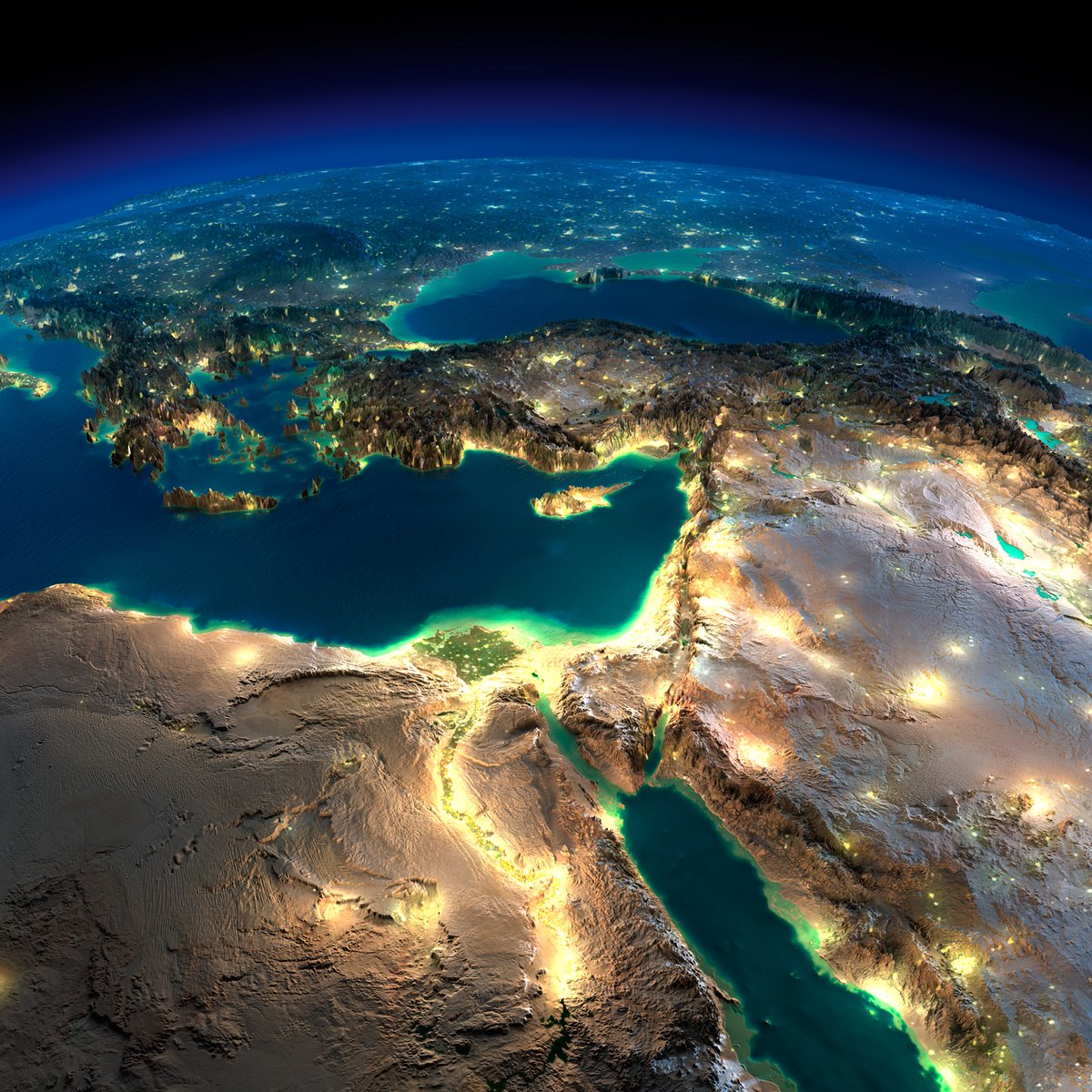
 All nations need rain (which we pray for on Succot). We are all part of nature. We are all dependent on the complex ecology of the created world.
All nations need rain (which we pray for on Succot). We are all part of nature. We are all dependent on the complex ecology of the created world.

 One Yom Kippur, the Baal Shem Tov was praying together with his students, and he had a worrying sense that the prayers were not getting through, and the harsh heavenly decree against the Jewish people was not being overturned.
One Yom Kippur, the Baal Shem Tov was praying together with his students, and he had a worrying sense that the prayers were not getting through, and the harsh heavenly decree against the Jewish people was not being overturned.

 That is what #YomKippur is about: finding the courage to let go of the need for self-esteem that fuels our passion for self-justification, our blustering claim that we are in the right when in truth we know we are often in the wrong.
That is what #YomKippur is about: finding the courage to let go of the need for self-esteem that fuels our passion for self-justification, our blustering claim that we are in the right when in truth we know we are often in the wrong.

 The answer is that it dates back to the Temple sacrifices, specifically to the sin offering on which a sinner confessed their sin by saying “Chatati aviti pashati”, “I have done wrong, I have sinned”, and then specified the sin.
The answer is that it dates back to the Temple sacrifices, specifically to the sin offering on which a sinner confessed their sin by saying “Chatati aviti pashati”, “I have done wrong, I have sinned”, and then specified the sin.

 Once a great naval ship sailed into port. On the hillside overlooking the sea, a crowd had gathered to watch it enter including a small child who waved to the ship. An adult asked the child to whom he was waving. The child replied, “I'm waving to the captain of the ship.”
Once a great naval ship sailed into port. On the hillside overlooking the sea, a crowd had gathered to watch it enter including a small child who waved to the ship. An adult asked the child to whom he was waving. The child replied, “I'm waving to the captain of the ship.”

 Teshuvah is about my relationship with myself. Tefillah is about my relationship with God. Tzedakah is about our relationship with other people. So what we're saying is that we can transform our fate because these three elements define who we are.
Teshuvah is about my relationship with myself. Tefillah is about my relationship with God. Tzedakah is about our relationship with other people. So what we're saying is that we can transform our fate because these three elements define who we are.

 Whenever you do a mitzvah, stop and be mindful. Every mitzvah is there to teach us something, and it makes all the difference to pause and remember why. Mindless Judaism is not good for the soul.
Whenever you do a mitzvah, stop and be mindful. Every mitzvah is there to teach us something, and it makes all the difference to pause and remember why. Mindless Judaism is not good for the soul.

 Never ever be embarrassed about being a Jew. Our people has survived so long and contributed so much, that you should see being Jewish as an honour and a responsibility.
Never ever be embarrassed about being a Jew. Our people has survived so long and contributed so much, that you should see being Jewish as an honour and a responsibility.
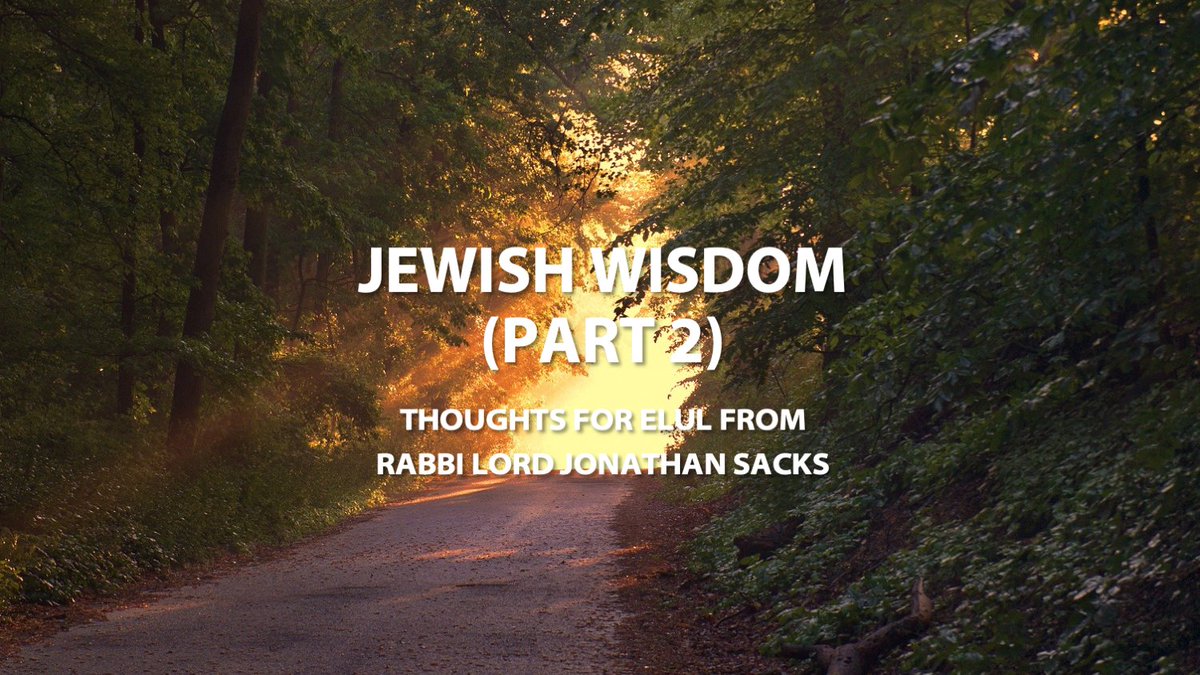
 You will find much in life to distress you. People can be careless, cruel, thoughtless, offensive, arrogant, destructive, insensitive and rude. That is their problem, not yours. Your problem is how to respond. Don’t react. Don’t respond...
You will find much in life to distress you. People can be careless, cruel, thoughtless, offensive, arrogant, destructive, insensitive and rude. That is their problem, not yours. Your problem is how to respond. Don’t react. Don’t respond...
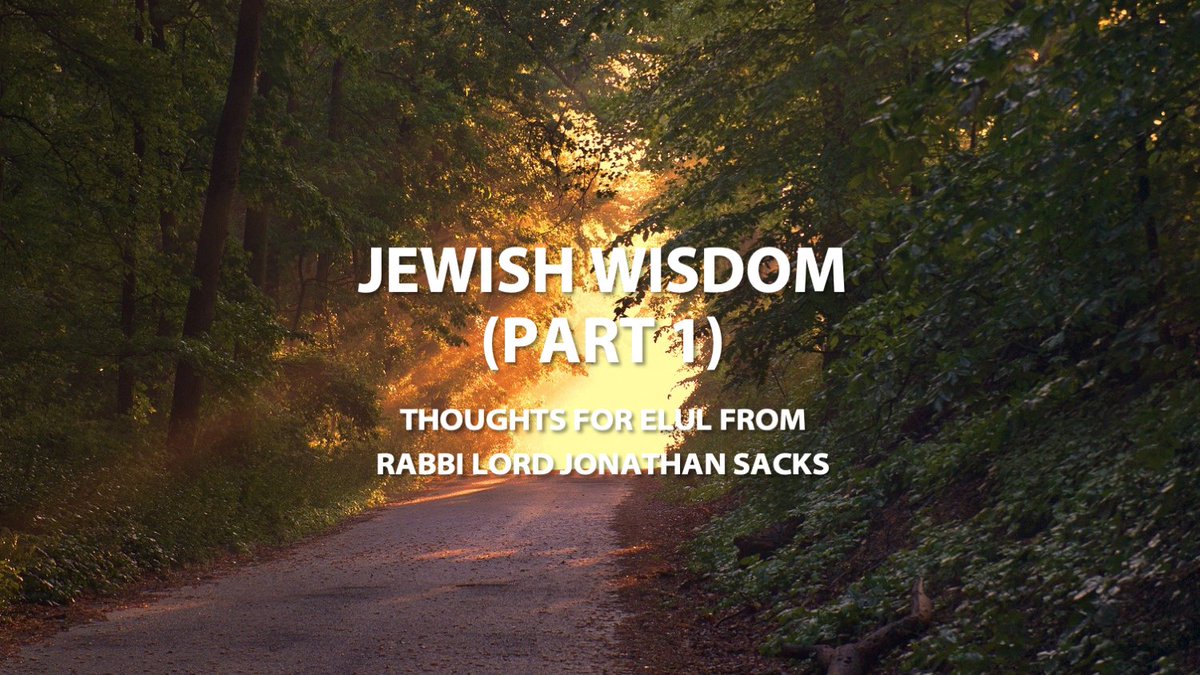
 So in my threads this week, I want to focus first on some of the things Judaism has taught me about life, and then, about what life has taught me about Judaism. Here is part one (of two) of what Judaism has taught me about life:
So in my threads this week, I want to focus first on some of the things Judaism has taught me about life, and then, about what life has taught me about Judaism. Here is part one (of two) of what Judaism has taught me about life:

 A series of research exercises suggested that young people who use electronic devices around bedtime were twice as likely to have inadequate sleep and three times more likely to feel drowsy the next day. Even having one in the room and not using it, is, they said, bad for sleep.
A series of research exercises suggested that young people who use electronic devices around bedtime were twice as likely to have inadequate sleep and three times more likely to feel drowsy the next day. Even having one in the room and not using it, is, they said, bad for sleep.

 No people ever cared for education more. Our ancestors were the first to make education a religious command, and the first to create a compulsory universal system of schooling. The rabbis valued study as higher even than prayer.
No people ever cared for education more. Our ancestors were the first to make education a religious command, and the first to create a compulsory universal system of schooling. The rabbis valued study as higher even than prayer.

 So many of us have passions and if you don't have a passion, take time out to discover it. Dream a lot. Think what would be a life you would really live for. Keep your dreams. Joseph dreamt dreams. A Jewish leader is one who dreams dreams and that's what you want to do.
So many of us have passions and if you don't have a passion, take time out to discover it. Dream a lot. Think what would be a life you would really live for. Keep your dreams. Joseph dreamt dreams. A Jewish leader is one who dreams dreams and that's what you want to do.

 The truth is that you can look at the world and find it meaningless; you can look at the world and find it meaningful. If you're looking for a life without doubt, without risk and without uncertainty, stop living because you cannot really live without taking risks.
The truth is that you can look at the world and find it meaningless; you can look at the world and find it meaningful. If you're looking for a life without doubt, without risk and without uncertainty, stop living because you cannot really live without taking risks.

 He sold schmutters [fabrics] in London's East End - it's like the lower east side of New York - but he was never tremendously successful at business. He was one of those people who didn't get the opportunities that he might have done in another time, another place.
He sold schmutters [fabrics] in London's East End - it's like the lower east side of New York - but he was never tremendously successful at business. He was one of those people who didn't get the opportunities that he might have done in another time, another place.
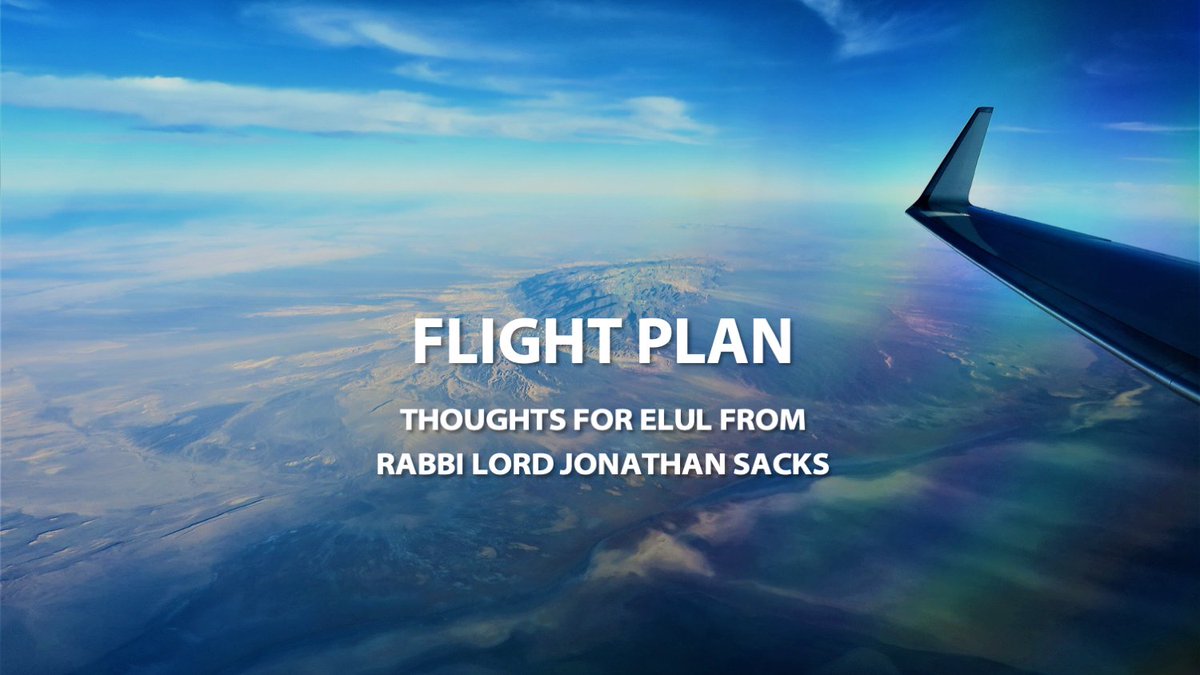
 But in the course of the flight, all sorts of factors drive the plane off course: wind, rain, turbulence, air traffic, human error and other causes.
But in the course of the flight, all sorts of factors drive the plane off course: wind, rain, turbulence, air traffic, human error and other causes.
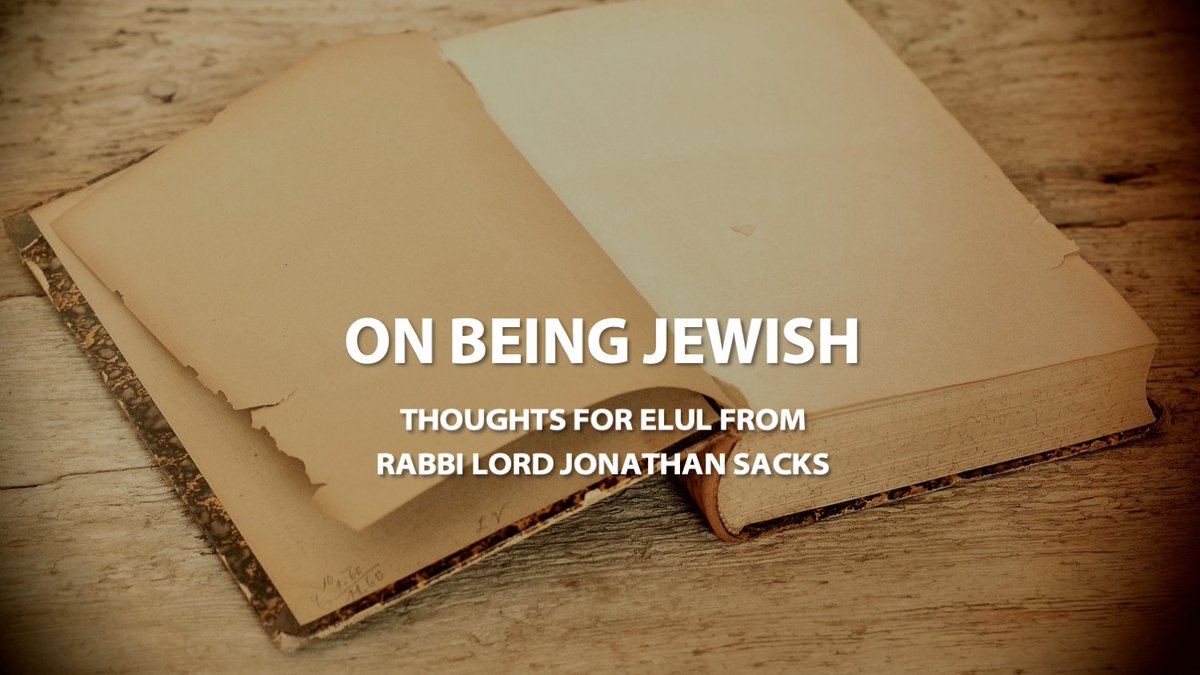
 There's a book and on the title, it’s got your name. You take it out, open it up, and you see that there are several hundred pages of that book written by many different hands in different languages.
There's a book and on the title, it’s got your name. You take it out, open it up, and you see that there are several hundred pages of that book written by many different hands in different languages.

 And the traditional explanation that's given is that there is a sort of coded reference to Rosh Hashanah, Yom Kippur, and Sukkot in the psalm itself.
And the traditional explanation that's given is that there is a sort of coded reference to Rosh Hashanah, Yom Kippur, and Sukkot in the psalm itself.